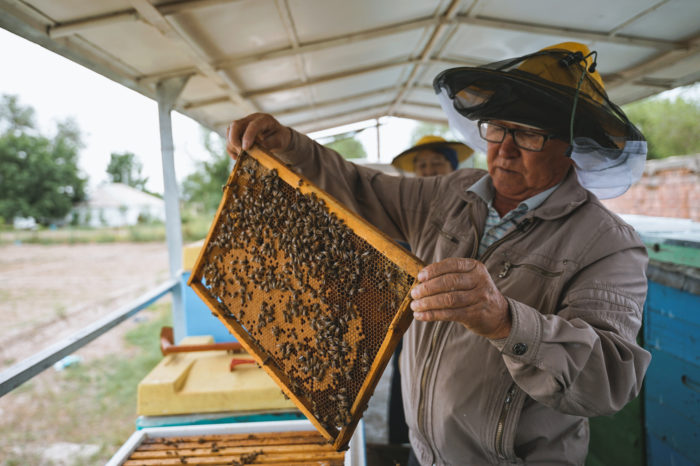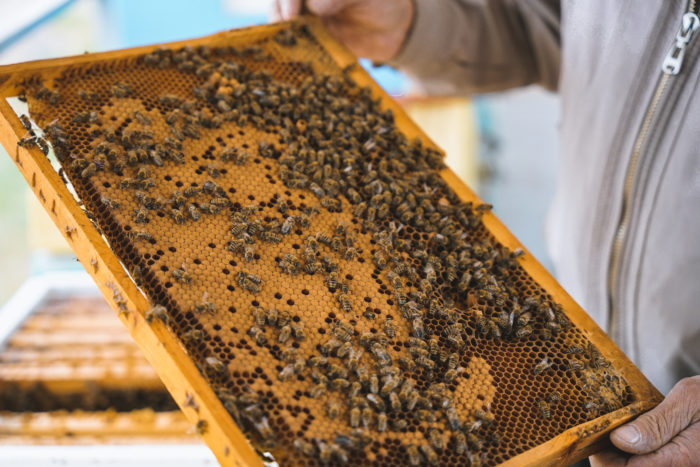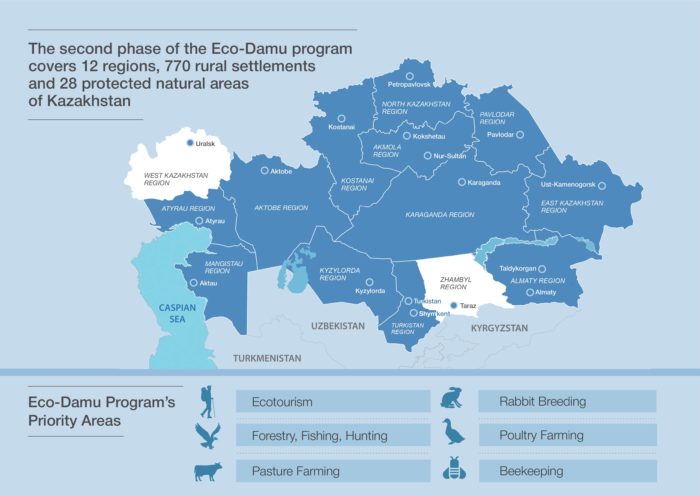NUR-SULTAN – Creating a feeling of respect for biodiversity and ecosystem development are seen as one of the major challenges of conservation. In this light, increasing green business opportunities are essential for any nation.

Ryash Stambekov, an entrepreneur from Bakanas village (Almaty region) has been involved in beekeeping for 10 years. Photo credit: UNDP in Kazakhstan.
In Kazakhstan, the United Nations Development Programme (UNDP) with the support of the Global Environment Facility has been implementing major initiatives to protect, restore and sustainably manage ecosystems and biodiversity, and support local communities in contributing to it, providing benefits for both people and nature.
The story of Ryash Stambekov, an entrepreneur from Bakanas village (Almaty region), who has been involved in beekeeping for 10 years, is one of the inspiring examples of combining economic value and respect for the ecosystem.

Bees are among the most active agents in promoting Sustainable Development Goals. Bees support biodiversity and agricultural productivity by pollinating flowering crops and wild plants.
In 2015, Stambekov received a 4.5 year loan for his business as part of the Eco-Damu Loan Program for 2020-2024. The project supports people who live near specially protected natural areas to launch or develop businesses that contribute to the sustainable preservation.
“I purchased the equipment including an apiary and a car for transporting bees, a bee-house, dishes for transporting honey and pedigree queen bees of the Carpathian and Austrian carnica breeds,” Stambekov said.

Bees migrate mainly in the Almaty region, constantly changing their location.
“Our sustainable business has expanded significantly during these six years,” he added. “The number of bee colonies has increased from five to 30. Bees have a beneficial effect on yields in the region by pollinating plants and trees. I sell products in the Balkhash region. Now I am participating in the second stage of the Eco Damu program in order to further develop my business.”
According to the UNDP in Kazakhstan, bees are among the most active agents in promoting Sustainable Development Goals (SDGs). Bees support biodiversity and agricultural productivity by pollinating flowering crops and wild plants. Beekeeping supports sustainable livelihoods and job creation, especially in rural areas, and helps meet the demand for healthy and nutritious food. Unfortunately, the population of bees is sharply declining due to intensive farming methods and climate change.
This year, the UNDP in Kazakhstan, jointly with the Forestry and Wildlife Committee of the Kazakh Ministry of Ecology, Geology and Natural Resources and the Financial Support Fund for Agriculture has launched the second phase of the Eco-Damu Loan Program for 2020-2024.
The second phase of the Eco-Damu Program covers 12 regions, 770 rural settlements and 28 specially protected natural areas of Kazakhstan, with a total budget of 275.3 million tenge (US$649,000).
At the first stage (2014-2019), the program covered rural districts located around four specially protected natural areas including the Barsakelmes and Ustyurt reserves, Altyn Emel national park, and the Ile-Balkash nature reserve.
As a result, 83 business projects worth 275.3 million tenge (US$641,904) were financed. This allowed rural residents to develop fish farming, guest houses and make souvenirs, engage in gardening, beekeeping, greenhouse farming, poultry farming and open their own bakeries. Some 209 jobs were created.
“Environmental initiatives that are launched by public organizations together with specially protected natural areas are implemented out on a non-commercial basis, because it is generally accepted that business and environmental protection are not always compatible,” UNDP biodiversity projects Portfolio Manager Talgat Kerteshev said in an interview for this story.
But businesses can also advance biodiversity conservation in protected areas, explained the expert. “Provision of microloans to the rural population living near protected areas is an effective tool for involving the population in the implementation of environmental protection measures,” Kerteshev added.
Overall, more than ten microcredit programs aimed at supporting small and medium-sized businesses are available in Kazakhstan. To support means to invest in a business for further expansion or increasing profits.
“The Eco-Damu program targets other priorities. It is primarily aimed at preserving nature and biodiversity. Due to this we can say that this is a unique initiative,” said Kerteshev.
The projects financed as part of the Eco-Damu program are focused on rational use of natural resources and maintaining balance of the ecosystem.
“The mission of the program is to combine business interests and biodiversity conservation. And these initiatives that work with – not against – nature can help both people and the planet to prosper,” said the expert.
Rinat Nurgazin, the head of the Department of Specially Protected Natural Areas of the Forestry and Wildlife Committee, reported that job opportunities are one of the major advantages of the programs such as Eco-Damu.
“This motivates rural residents to develop micro-businesses while protecting the environment. The program also contributes to the promotion of healthy ecosystems and protection of biodiversity,” he said.
